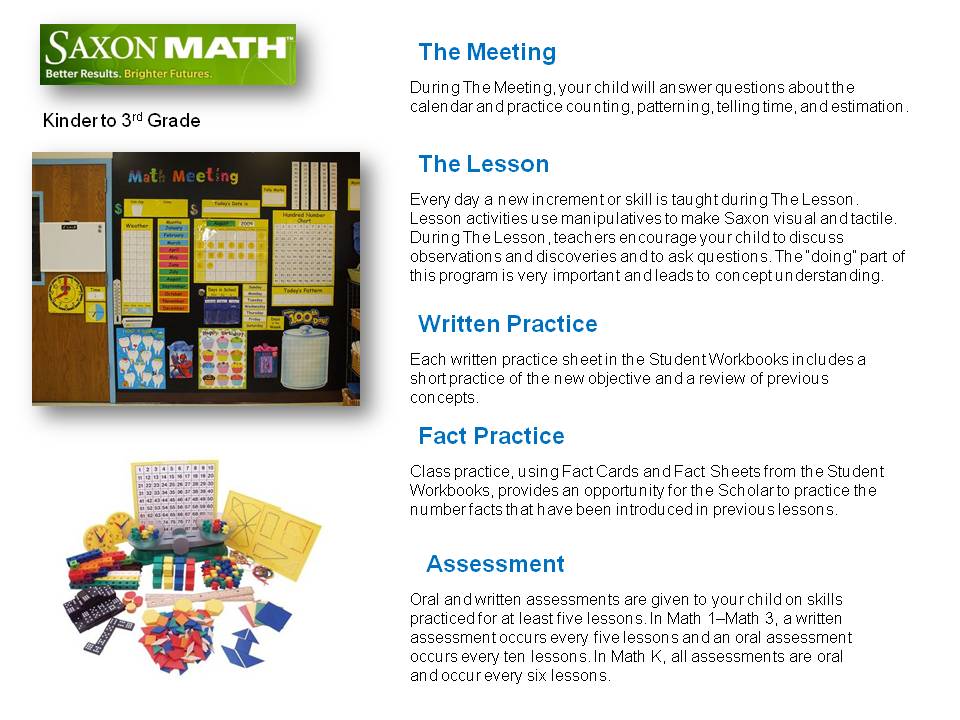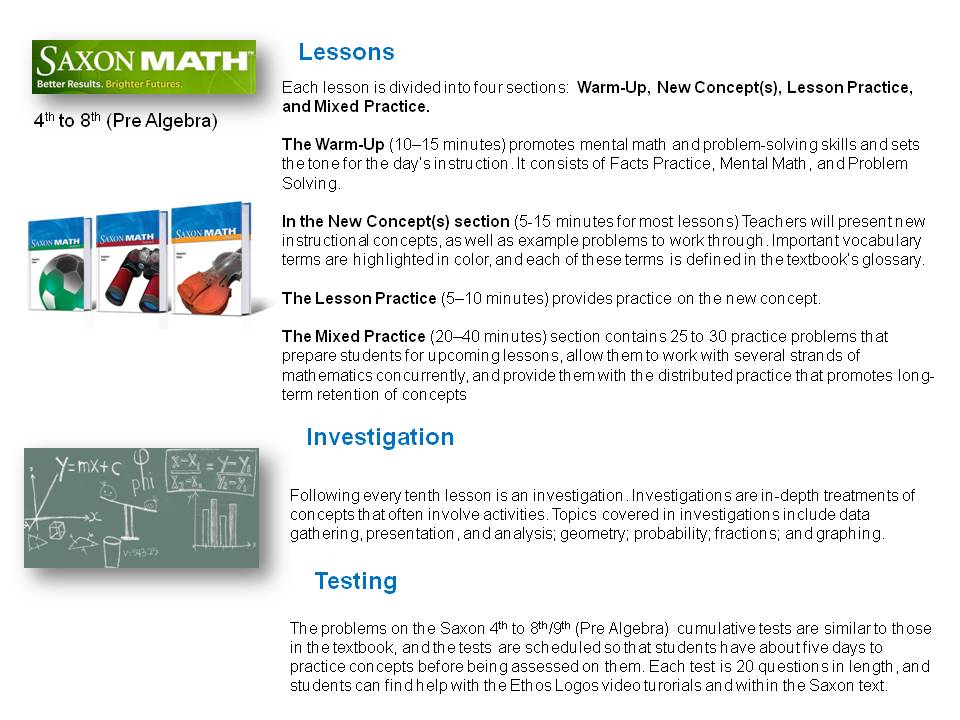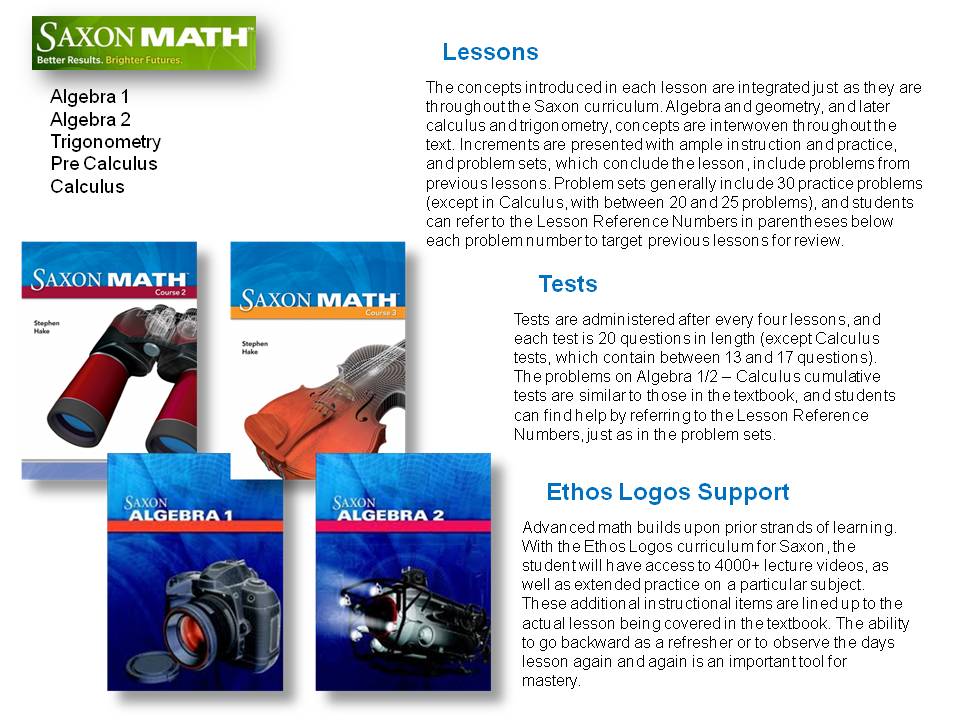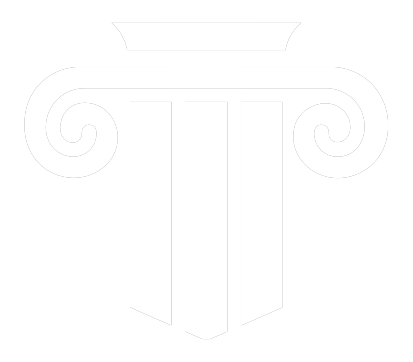Saxon math, developed by John Saxon, is a teaching method for incremental learning of mathematics. It involves teaching a new mathematical concept every day and constantly reviewing old concepts. While other math curricula ask students to progress from simple to complex concepts in just a few weeks, Saxon Math scaffolds instruction of each concept and continues to review information introduced earlier. This allows students the time and practice to retain math concepts to the level of mastery.
 Saxon Math is a core curriculum for students in Kindergarten through 12th grade. At the intermediate and middle-grade levels, daily lessons introduce new concepts and skills, incorporating real-world problem solving and applications of mathematics. Saxon Math is aligned with the Common Core State Standards. This alignment has some gaps that the Ethos Logos field testing has identified and addressed.
Saxon Math is a core curriculum for students in Kindergarten through 12th grade. At the intermediate and middle-grade levels, daily lessons introduce new concepts and skills, incorporating real-world problem solving and applications of mathematics. Saxon Math is aligned with the Common Core State Standards. This alignment has some gaps that the Ethos Logos field testing has identified and addressed.
High School Advanced Mathematics includes the equivalent of the second half of geometry, plus advanced algebra, pre-calculus, and trigonometry.
National Council of Teachers of Mathematics (NCTM)
Students will take 13 years of mathematics at Ethos Logos schools. The National Council of Teachers of Mathematics (NCTM) stated that in order for students to receive a comprehensive mathematics education they must understand the need for mathematics in everyday life. The Ethos Logos program compliments the Saxon Math program with resource-rich folders for each of the 1,000+ lessons students will have in the K to 8 classrooms. These folders have 3 to 5 videos delivered in different methods from black screen close-ups on a page of instruction to lectures at a whiteboard. Inside the Saxon support modules, there are 3.000+ videos for students to watch at home before or after the lesson in the classroom. If the student is struggling with an advanced concept, they can look backward at the building blocks of concepts that lead to the current strand of learning.
NTCM matches their framework to the Ethos Logos Curriculum scope and sequence in our K-12 school’s math program. The role of the teacher will be to ensure that students have a firm understanding of how to achieve: Problem Solving - Reasoning & Proof – Communication – Connections -Representation
Why Saxon Math Is Effective
The mathematics program of instruction will have at the foundation, the Saxon Math program. Saxon Math has a purposeful spiraling aspect that refreshes on basic concepts for the first 24-33% of the lessons then slowly introduces basic core concepts for the particular course and builds upon those concepts to mastery. Research also suggests there is value in a teaching method that uses small, easily digestible chunks of information within its lessons (Ausubel, 1969; Brophy & Everston, 1976). Studies by Rosenshine and Stevens (1986) and Brophy and Everston (1976) demonstrated the importance of using incremental steps when teaching new information. Effective concept development involves incremental skill instruction distributed throughout a school year.
In selecting the Saxon Math program for the Ethos Logos math program, we looked for a program explicitly aligned to the Classical model's philosophical approach, specifically:
- Follows the learning stages synonymous with Classical schools and the Trivium stages of learning. With foundational skills in the early years (Grammar stage) that build into deeper concepts and mastery of multi-step functions into the Logic and Rhetoric stages.
- Integration of conceptual understanding, computation fluency, and problem-solving skills. These traits are critical for building on a math future for scholars and the passing of state tests.
- Saxon is State Standards and Common Core-aligned but the program designed by John Saxon in the mid-1980s has some language variations to today’s end of year testing. These variations have been identified and programmed into the year's instruction as POWER-UPS to be used at the beginning of each week. For example, Saxon may call out the Sum of two numbers and at the end of the year test, the prompt may be the Addition of two numbers. Ethos Logos has identified these language variations and built into their program solutions for the classroom teacher.
- Proficiency to mastery of whole-number operations, fluency with standard algorithms, and understanding of core math laws of operations. Sufficient opportunities for practice with whole-number operations are necessary to develop automatic recall of core math tenants.
- Math learning of all students can be improved by a strong differentiation program in the classroom and interventions that address social, effective, and motivational factors.
- Professional development of teaching staff with an emphasis on data usage for math strand weakness.
- Making math relevant is a constant goal of the Saxon program and support by the Ethos Logos Curriculum modules. The Ethos Logos module has hundreds of real-world examples of math concepts to help connect the textbook to the real world.
Our rationale for selecting this program draws heavily from research which indicates that students who are taught with a mathematics curriculum that uses continual practice and review demonstrate greater math achievement and skill acquisition than do students who are taught with a mass approach (Good & Grouws, 1979; Hardesty, 1986; MacDonald, 1984; Mayfield & Chase, 2002; Ornstein, 1990; Usnick, 1991).



Develop Foundational Understanding
Through daily reinforcement, practice, and application of basic skills and concepts, students build conceptual understanding, computational fluency, and problem-solving skills and strategies. This foundation supports a steady progression through higher levels of mathematics.
In younger grades, Saxon includes engaging manipulatives and hands-on learning tools to help students develop and demonstrate understanding. The morning math time Saxon wall is interactive and helps anchor math skills needed for higher level computation.
Ensure Retention of Mathematical Concepts
Students build skills and confidence through daily opportunities to review, develop mathematical reasoning, and apply knowledge.
Demonstrate Measurable and sustained improvement
The instructional effectiveness of Saxon Math is clear. Decades of research show classrooms using Saxon consistently see a dramatic improvement in student achievement.
The Teacher and Saxon Math
Easy-to-follow daily lessons offer a consistent structure to deepen mastery.
Classroom Discourse
Daily discussion and practice help students build an understanding of basic skills, mathematical concepts, and problem-solving strategies.
Hands-On Learning
New concepts expand students’ knowledge through hands-on activities using manipulatives and other materials.
Writing
Students gain depth of knowledge through written practice, which gives them the opportunity to review and apply concepts.
Summative and Formative Assessments
Summative assessments, including Power Up, Cumulative, Benchmark, and End-of-Year tests, allow teachers to continuously monitor progress.
Formative assessments conducted through daily instruction, lesson practice, and written practice provide immediate feedback for intervention and enrichment.

